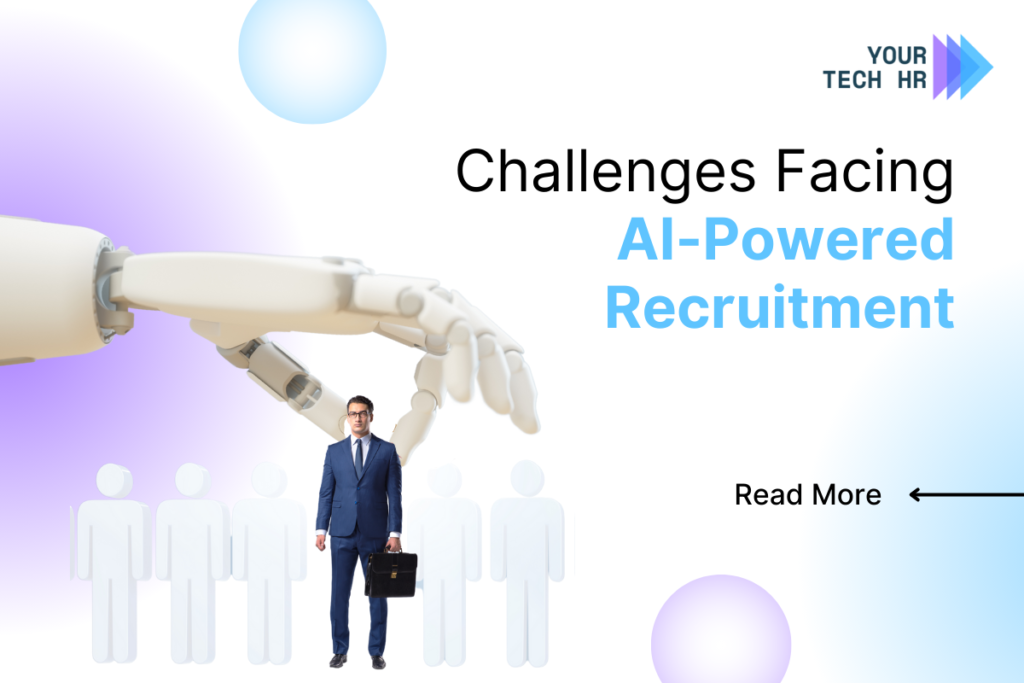In today’s fast-paced business world, artificial intelligence (AI) has become a game-changer in many industries, and recruitment is no exception. As we look ahead to 2024, AI-powered recruitment is set to transform how companies find and hire talent. But with great power comes great responsibility, and there are several challenges that HR professionals and recruiters need to be aware of. In this blog post, we’ll explore the main challenges facing AI-powered recruitment in 2024 and what you need to watch out for.
1. AI Bias in Hiring: The Elephant in the Room
One of the biggest challenges facing AI-powered recruitment is the potential for bias. AI systems learn from historical data, and if that data contains biases, the AI can perpetuate and even amplify them. This can lead to unfair hiring practices and a lack of diversity in the workplace.
What to watch out for:
- Gender bias: AI systems might favor one gender over another based on past hiring patterns.
- Racial bias: Historical data may lead to discrimination against certain racial or ethnic groups.
- Age bias: AI might unintentionally prefer candidates of a certain age range.
How to overcome AI bias in hiring processes:
- Regularly audit your AI systems for bias
- Use diverse data sets to train your AI
- Implement human oversight to catch and correct biases
- Consider using AI tools specifically designed to detect and mitigate bias
2. The Changing Face of Candidate Screening
AI is revolutionizing how we screen candidates, making the process faster and more efficient. However, this comes with its own set of challenges.
What to watch out for:
- Over-reliance on keywords: AI systems might miss qualified candidates who don’t use the “right” keywords in their resumes.
- Difficulty in assessing soft skills: AI may struggle to evaluate important traits like creativity, emotional intelligence, and adaptability.
- Candidate experience: An overly automated process might feel impersonal and turn off potential hires.
How AI transforms candidate screening methods:
- Use of natural language processing to understand context, not just keywords
- Implementation of video interview analysis to assess soft skills
- Creation of personalized screening processes based on job requirements
3. Ethical Considerations for AI in Recruitment
As AI becomes more prevalent in recruitment, ethical concerns are coming to the forefront. It’s crucial to ensure that AI is used responsibly and transparently.
What to watch out for:
- Privacy concerns: AI systems collect and analyze vast amounts of candidate data, raising questions about data protection and privacy.
- Lack of transparency: Candidates might feel uneasy about being evaluated by an AI system they don’t understand.
- Job displacement: As AI takes over more recruitment tasks, there’s concern about the role of human recruiters.
Ethical considerations for AI in recruitment:
- Be transparent about the use of AI in your hiring process
- Ensure compliance with data protection regulations
- Maintain a balance between AI and human involvement in decision-making
4. The Long-term Impact of AI in Recruitment
While AI offers many benefits, it’s important to consider its long-term effects on the recruitment industry and the job market as a whole.
What to watch out for:
- Skill gaps: As AI takes over routine tasks, recruiters will need to develop new skills to stay relevant.
- Changes in job requirements: AI might change what companies look for in candidates, potentially making some skills obsolete.
- Impact on diversity and inclusion: If not managed properly, AI could hinder efforts to create diverse and inclusive workplaces.
Long-term impact of AI in recruitment:
- Shift towards more strategic roles for human recruiters
- Increased focus on soft skills and adaptability in candidates
- Need for continuous learning and upskilling in the recruitment industry
5. Overcoming Technical Challenges in AI-Powered Recruitment
While AI technology is advancing rapidly, it still faces several technical challenges that can impact its effectiveness in recruitment.
What to watch out for:
- Data quality issues: AI systems are only as good as the data they’re trained on. Poor quality data can lead to inaccurate results.
- Integration problems: Many companies struggle to integrate AI tools with their existing HR systems.
- Scalability concerns: As companies grow and hiring needs change, AI systems need to be able to scale accordingly.
Overcoming technical challenges:
- Invest in data cleaning and preparation
- Choose AI tools that integrate well with your current systems
- Regularly update and retrain your AI models to ensure they remain effective
6. Balancing Efficiency and Human Touch
While AI can greatly increase efficiency in the hiring process, it’s important not to lose the human element that’s crucial in recruitment.
What to watch out for:
- Overautomation: Relying too heavily on AI can make the recruitment process feel impersonal.
- Missed nuances: AI might miss subtle cues that a human recruiter would pick up on.
- Candidate frustration: Some candidates might feel frustrated if they can’t interact with a human during the process.
Balancing AI and human involvement:
- Use AI for initial screening and data analysis
- Have human recruiters conduct final interviews and make hiring decisions
- Provide options for candidates to connect with human recruiters if needed
Conclusion: Navigating the Future of AI-Powered Recruitment
As we look towards 2024, it’s clear that AI will continue to play a significant role in recruitment. While the challenges are real, they’re not insurmountable. By staying aware of these issues and taking proactive steps to address them, companies can harness the power of AI to improve their hiring processes while maintaining fairness, ethics, and the human touch that’s so crucial in recruitment.


